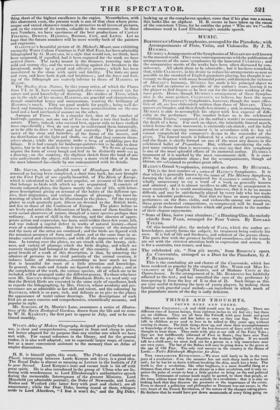MUSIC.
BEETHOVEN'S Grand Symphonies, arranged for the Pianoforte; with Accompaniments of Flute, Violin, and Violoncello. By J. N. HUMMEL.
HUMMEL'S Arrangements of the Symphonies of Moz ART are well known to the musical world. They were contemporaneous with the publication of arrangements of the same symphonies by the lamented CLEMENT! ; and the comparative merits of the works have been often discussed by con- noisseurs. All admit them to be admirable ; but it has been remarked, that, while CLEMENT!, in his desire to reduce his arrangements as near as possible to the standard of English pianoforte playing, has thought it ne- cessary to dispense with many beautiful points, and diminish the richness of Moziter's harmony, liummni. has made it his principal object to give as full an epitome as possible of the author's score, leaving it to the player to find fingers as he best can for the intricate working of the inner parts. Hence, though Hummm.'s arrangement of these Sympho- nies is the more perfect, CLEMENTI'S, we believe, has been the more popular. BEETHOVEN'S Symphonies, however, though the most effec- tive of all, are less elaborately written than those of MOZART. Their masses are broader, and their details less minute ; and, in arranging them, HU31MEL is able to accomplish his object with less expense of diffi- culty to the performer. The number before us is the celebrated " Sinfonia Eroica," composed (in the author's words) to commemorate the death of a hero. For such an object, the inimitable funeral march, which forms the slow movement, is eminently calculated ; and the lofty grandeur of the opening movement is in accordance with it : but we cannot comprehend the composer's design in the remainder of the piece. Tile funeral march is followed by a scherzo of great vivacity, and the finale is chiefly formed on one of the most airy dances in the celebrated ballet of Prometheus. But, without considering the sub- ject more curiously than is necessary, we may say that this symphony is one of the most splendid efforts of its immortal author. HummEt's treatment of it is marked by the most consummate skill. It is com- plete for the pianoforte alone ; but the accompaniments, though ad libitum, are calculated to produce great effect.


























 Previous page
Previous page